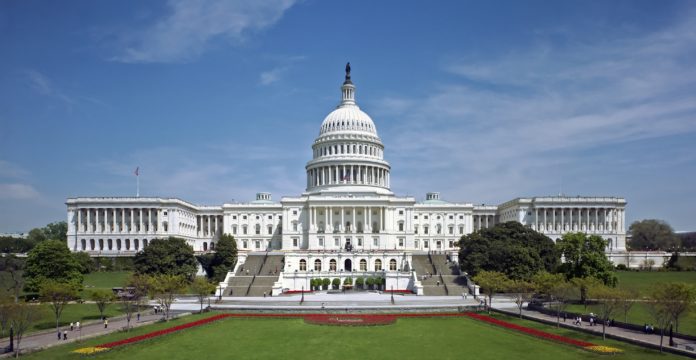This article was originally published on VOA and translated by OKN Correspondent.
Most of the pending bills in the U.S. Congress related to the Korean Peninsula have focused on North Korean human rights and humanitarian aid to North Korea, and Republican Rep. Young Kim has been identified as the most active legislator on this issue. However, the number of bills to be introduced, deliberated, and passed, has significantly dropped over the past two years.
Bills on North Korean human rights and humanitarian assistance to North Korea took up 40% of all pending bills in the U.S. Congress related to foreign affairs and security toward the Korean Peninsula.
Thirteen legislations on the diplomatic and security issues of the Korean Peninsula are pending in the Senate and House. Five bills are about North Korean human rights and humanitarian assistance, such as the Senate’s “Otto Warmbier Countering North Korean Censorship and Surveillance Act,” House and Senate’s “North Korean Human Rights Reauthorization Act,” and “Enhancing North Korea Humanitarian Assistance Act.”
The “Otto Warmbier Countering North Korean Censorship and Surveillance Act” was introduced by Republican Senator Rob Portman in June last year. It authorizes the budget for “broadcasting in North Korea and the development of internet freedom tools and imposing sanctions on foreign individuals and entities responsible for implementing or facilitating North Korea’s censorship laws and surveillance.”
This bill is the second “Warmbier bill” in the U.S. Congress, named after American college student Otto Warmbier, who died shortly after returning to the U.S. after being detained in North Korea in 2017.
The House and Senate “North Korean Human Rights Reauthorization Act” calls to extend the North Korean Human Rights Act enacted in 2004 by five years. It was introduced by Republican Rep. Young Kim and Democratic Rep. Ami Bera in March and by Republican Senator Marco Rubio and Democratic Senator Time Kaine this month.
The key to the bicameral “Enhancing North Korea Humanitarian Assistance Act” is to revise some of the sanctions regulations against North Korea to proceed with NGOs’ humanitarian aid projects to North Korea quickly and smoothly.
Democratic Senators Edward Markey and Andy Levin reintroduced the bill in March.
In addition, the Senate and House’s “Divided Families Reunification Act,” although it is not relevant to humanitarian aid to North Korea, addresses the need for the U.S. government to define the divided families reunion issue as humanitarian and resolve it promptly.
“Divided Families Reunification Act,” introduced by Democratic Sen. Meiji Hirono and Rep. Grace Meng, passed the House in July last year with a similar House resolution. Currently, it is pending in the Foreign Relations Committee, a standing committee in the Senate.
It shows that 60% of the bills related to Korea in the current session of the U.S. Congress contains “humanitarian” purposes, including bills on North Korean human rights and humanitarian aid to North Korea and bills and resolutions on divided families reunions.
Democratic Rep. Ami Bera and Republican Rep. Young Kim have been the legislators sponsoring most of the Korea-related bills in the 117th Congress that started last year.
Rep. Bera, Chairman of the Subcommittee on Asia, the Pacific, Central Asia of the House Foreign Relations Committee, sponsored the North Korean Human Rights Reauthorization Act with Rep. Kim. In May last year, he also jointly introduced the House Resolution on “Recognizing the historic transformation of the United States-Republic of Korea alliance” with the Foreign Relations Committee members.
Rep. Bera has also co-sponsored the bill and resolution on divided families reunification and is the co-chair of the Korea Caucus and Congressional Study Group on Korea, respectively.
As the main sponsor of the North Korean Human Rights Reauthorization Act, Rep. Kim also co-sponsored the bill and resolution on divided families reunification. She also pushed ahead to include amendments on enforcing sanctions against North Korea in the “U.S. competitiveness and counter China” package bill.
Rep. Kim was a former aide to former House Foreign Relations Committee Chairman Ed Royce, a Republican who retired in 2019, and was elected to Congress last year. With Rep. Bera, Rep. Kim is the co-chair of the House’s Congressional Study Group on Korea.
This session of the Congress is distinct from other sessions in that the four Representatives of Korean origin have sponsored almost every major bill on the Korean Peninsula.
Members of the U.S. Congress of Korean origin include Democratic Rep. Andy Kim, Republican Rep. Young Kim, who entered the Congress last year, Republican Rep. Michelle Steel, and Democratic Rep. Marilyn Strickland.
However, they were divided on the “Peace on the Korean Peninsula Act,” which was co-sponsored by Democratic Representatives Kim and Strickland only. This legislation urged a declaration on the end of the Korean War and was introduced by Democratic Rep. Brad Sherman.
Meanwhile, the number of bills on the Korean Peninsula being introduced, deliberated, and passed, tended to stay low over the past two years.
Out of 14 Korea-related bills total, only 1%–the House Resolution on the divided families reunification–was passed in the 117th U.S. Congress. The remaining 13 are still pending.
A total of 31 bills and resolutions related to the Korean Peninsula were introduced in the 116th U.S. Congress, of which 11 passed, accounting for 35% of the total.



